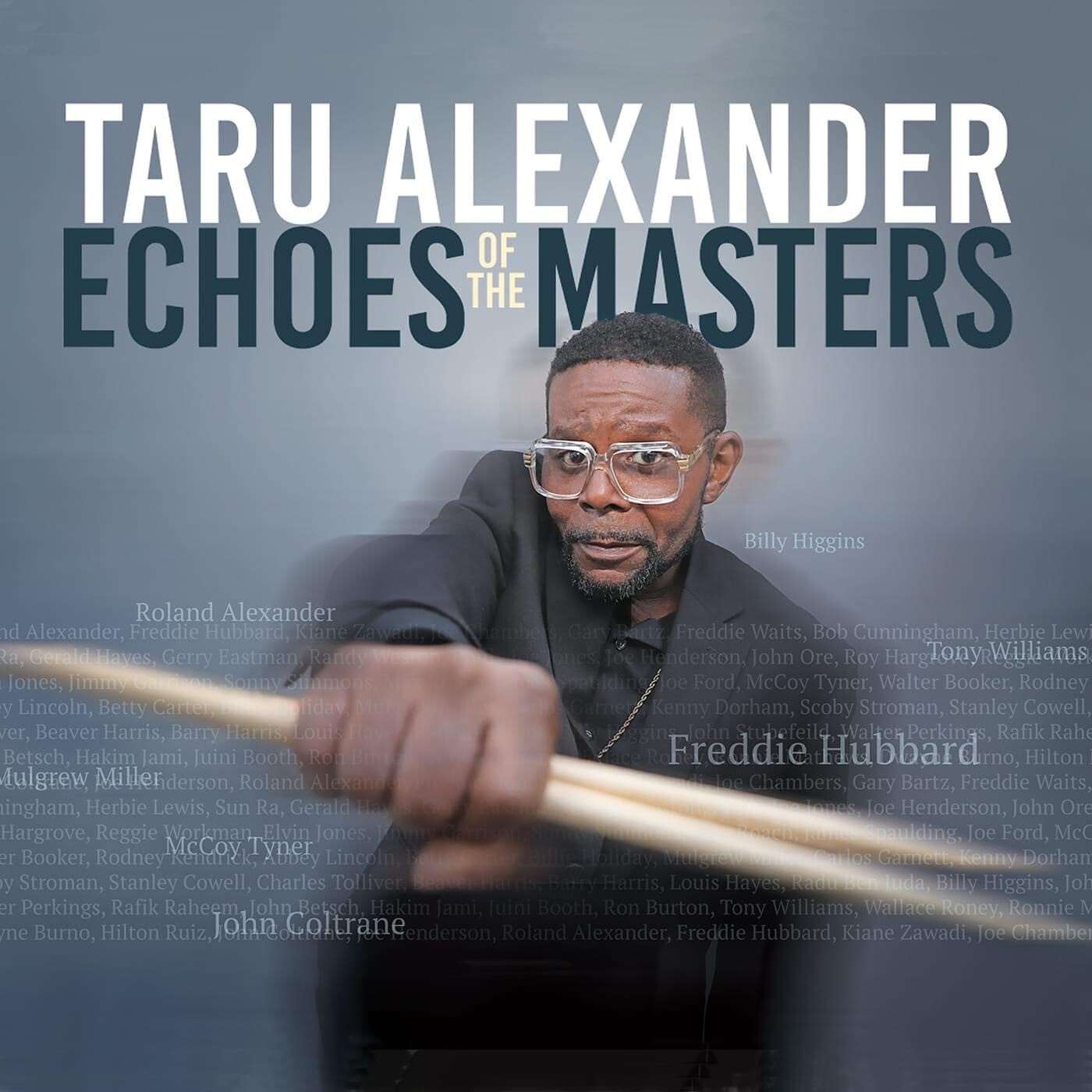
Echoes of the Masters album - signed
Promo video:
In the jazz community, there are individuals who come to music as a birthright. There are countless musical families whose members continue to pass the gift of music on from generation to generation. Drummer Taru Alexander was endowed with music by his father, saxophonist Roland Alexander, and an extended family of professional musician mentors in his native Brooklyn, New York.
The younger Alexander celebrates the legacy of his father and his father’s peers on his new recording, Echoes of the Masters, a collection of pieces by well-known jazz composers performed by an outstanding group of musicians who came of age under the tutelage of legendary performers on the bandstand.
Taru Alexander was born into music. His father, Roland, began taking him to gigs at 3 years old. The boy was entranced by the drums and began to pick them up naturally before he was 10. By the time he was 13 years old, Alexander was performing alongside his father and bass legend Reggie Workman, with whom he studied at Brooklyn’s famed New Muse School in Crown Heights. Further study with drummers Rudy Collins, Andre Strobert, Walter Perkins, and La Guardia Music & Art’s Justin DiCioccio prepared Alexander for life as a professional drummer.
A lifetime of musical experience has imbued Alexander with the skills, knowledge, and swagger to play jazz as it should be played. His credentials spread from bands led by Roy Hargrove, Gary Bartz, Carlos Garnett, and many more, so when he was considering who should join him on his new recording, Alexander wanted to include other musicians who had truly paid their dues.
Originally from Memphis, Tennessee, pianist James Hurt has been a focal part of the New York jazz scene since he arrived in 1994. Among many ensembles, Hurt was a member of Roland Alexander’s band, where he met Taru Alexander. Hurt also performed with groups led by Abbey Lincoln, Sherman Irby, Russell Gunn, and many others.
Alexander met saxophonist Antoine Roney and bassist Rashaan Carter on a recording session led by saxophonist Michael Marcus in 2008. Alexander was so impressed that he made a note to contact them when he was able to record on his own. Roney has been a stalwart leader and sideman in New York alongside fantastic musicians like Jacky Terrasson, Donald Byrd, John Patton, and his brother, Wallace Roney. Carter carries the history of the jazz bass on his shoulders having studied with Buster Williams, Reggie Workman, and Ron Carter. He continues to be one of the strongest players in New York.
During the pandemic, Alexander reached out to these stalwart musicians to be his band of certified players on his new album.
The recording launches into gear with a high-octane take of the elder Alexander’s “Change Up,” a piece penned in the 1970s that bridges the gap between the earlier generation’s verve with the younger generation’s swagger. Taru Alexander’s drums propel the quartet with great solos from Roney and Hurt. Thelonious Monk and Coleman Hawkins’s “I Mean You” adds guest vocalist HANKA G to the quartet for this swinging rendition of the classic tune, which is followed by Buster Williams’s “Deception” performed in a firey rendition.
Roland Alexander wrote “Kojo Time” for his son at the time of his birth and while the father was in Europe, the echo of a European ambulance signaling the to be drummer’s arrival can be heard in the theme. Alexander fell in love with McCoy Tyner’s “Peresina” from the pianist’s Expansions record, wearing it out after regular listens. The quartet honors the piece with an expansive reading with gorgeous features for the entire band. The recording concludes with Wayne Shorter’s “Pinocchio,” Hurt’s ambient piano leading to an up-tempo ensemble romp over Alexander’s persistent beat.
On Echoes of the Masters, Taru Alexander creates an aural tribute to his father, the great Roland Alexander, and the tremendous musicians who passed the tradition down to him and future generations through their impact on the bandstand and their examples off of it.
